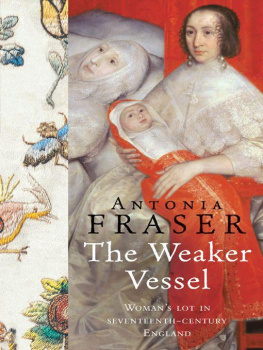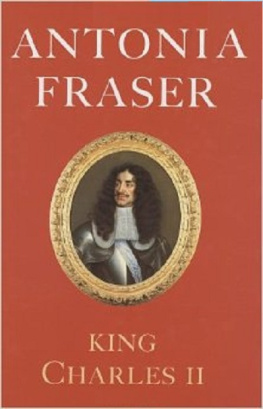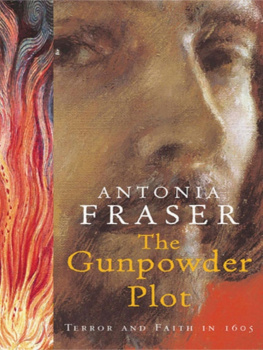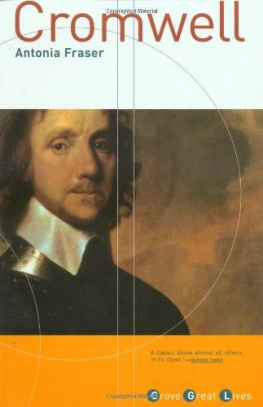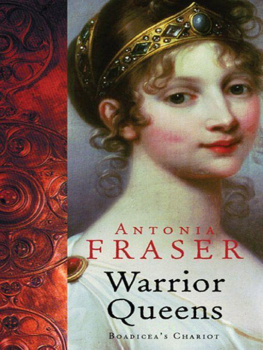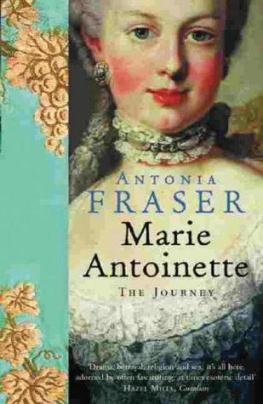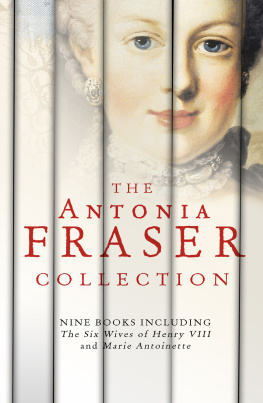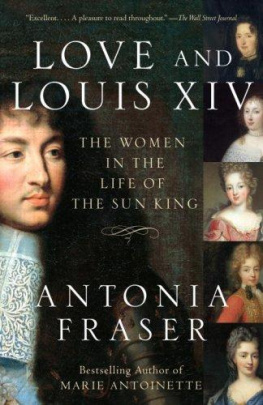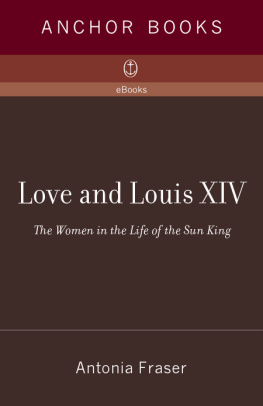The Weaker Vessel
Womans Lot in Seventeenth-century England
ANTONIA FRASER
PHOENIX
PRESS
5 UPPER SAINT MARTINS LANE
LONDON
WC2H 9EA
Contents
for
LECTISSIMA HEROINA ELIZABETH LONGFORD
By Antonia Fraser
Mary Queen of Scots
Cromwell: Our Chief of Men
King James VI of Scotland, I of England
(Kings and Queens series)
King Charles II
The Weaker Vessel: Womans Lot in Seventeenth-Century England
The Warrior Queens: Boadiceas Chariot
The Six Wives of Henry VIII
The Gunpowder Plot: Terror and Faith in 1605
Marie Antoinette: The Journey
Antonia Fraser is the author of many widely acclaimed historical works including the biographies King Charles II, the recently republished Mary Queen of Scots and Marie Antoinette: The Journey which won the Franco-British Literary Prize in 2001 and was made into a film by Sofia Coppola in 2006. Most recently she has published Love and Louis XIV: The Women in the Life of the Sun King.
Antonia Fraser won a Wolfson History Prize in 1984, was made CBE in 1999, and was awarded the Norton Medlicott Medal by the Historical Association in 2000. She lives in London and has six children and eighteen grandchildren.
Illustrations
Dorothy Countess of Sunderland (Earl Spencer, Althorp, Northampton; photograph by courtesy of the Courtauld Institute of Art)
Anne Countess of Winchilsea (National Portrait Gallery, London)
Authors Note
Were there any women in seventeenth-century England? This question was put to me by a distinguished person (male) when I told him the proposed subject of my new book; like another jesting interlocutor, he did not stay for an answer, but vanished up the steps of his club. This book is in part at least an attempt to answer that question.
Wherever possible I have quoted the voices of women themselves, in letters, in the few but poignant diaries, and in the reports of others. Obviously there are enormous difficulties with the written record where women of this period are concerned, in view of the fact that the vast majority below the gentry class were, through no fault of their own, illiterate. Nevertheless I have battled to breach the walls of this artificial silence. Indeed, if I have had a bias, it has been towards the unknown rather than the known; believing strongly in what we owe to the number who lived faithfully a hidden life, and rest in unvisited tombs, in the words of George Eliots moving conclusion to Middlemarch.
The idea of writing such a book first came to me in 1970 when I was working on a biography of Oliver Cromwell; it occurred to me that a study of women in the English Civil War would produce some interesting results, in view of the spirited nature of the women in question, whether petitioning, defending castles or fighting alongside their husbands a variety of activities, none of them particularly passive. Working on a life of Charles II, following these women through to the next generation, did nothing to diminish my ardour, but did show me how much more complicated the subject was than I had supposed.
After ten years of working on the seventeenth century I felt more enthusiasm than ever. But I did come to the conclusion that I must confine my study to England alone; although I had at an early stage wistfully contemplated including Scottish women, until the many differences in the laws as well as the society of the two nations convinced me that this was a separate subject. I also realized how important it was to take the hundred odd years from the death of Queen Elizabeth I to the accession of Queen Anne as a whole, if only to explore to what extent womans position in society did or did not improve with the passage of time.
This, then, is a study of womans lot: it is not intended as a dictionary of female biography in the seventeenth century, nor for that matter as an encyclopedia of womens topics. I have selected those characters who interested me; omissions were not only inevitable, if the book was not to be of mammoth size, but also deliberate.
Obviously, no one writes in a vacuum, and to boast of being unswayed by the currents of opinion swirling about in ones own time would be, like most boasts, foolish. During the twelve years in which I have been taking notes towards this book, the growth of feminism both as a force and an influence has been a spectacular phenomenon. But this book is, I hope, a historical work, not a tract. After all, to write about women it is not necessary to be a woman, merely to have a sense of justice and sympathy; these qualities are not, or should not be, the prerogative of one sex.
I have taken the usual liberties in correcting spelling and punctuation where it seemed necessary to make sense to the reader today. For the same reason I have ignored the fact that the calendar year was held to start on 25 March during this period, and have used the modern style of dates starting on 1 January throughout. This is an age which presents considerable problems to the writer, where the nomenclature of women is concerned. On the one hand, many of the them bore the same Christian name: in a host of Marys, Elizabeths and Annes, one learns to be grateful for the odd Jemima. On the other hand, equally confusingly, women at this period changed their surnames with frequency, due to marriage and remarriage. Sometimes, therefore, it has proved convenient to use a pet-name or diminutive consistently for a particular character; sometimes I have used the same surname or rank for a woman throughout the book (as for example Margaret Godolphin, antedating her marriage, and Margaret Duchess of Newcastle, despite the changes in her husbands title). My aim in all this has been clarity for the reader.
I wish to thank the Marquess of Bath for permission to quote from the Longleat MSS , and Miss Jane Fowles, Librarian and Archivist to the Marquess of Bath; Miss Cathleen Beaudoin, Reference Librarian of the Public Library, Dover, New Hampshire, for letting me see the Jon Scale MS on Quaker women; and the Wardens, Melvin and Sandra Roberts, of the Religious Society of Friends, Nottingham Meeting, for permission to quote from the letter of Isabel (Fell) Yeamans. I am grateful to the staff of numerous libraries, principal among them the Bodleian Library, the British Library, the Institute of Historical Research, the London Library and the New York Public Library.
I should also like to express my thanks to the following, who helped me in a variety of different ways over the years, from answering queries to conducting stimulating conversations: Dr Maurice Ashley; Professor John Barnard; Mr G.P. Bartholomew; Dr Chalmers Davidson; Mr Fram Dimshaw; Lt. Col. John Dymoke of Scrivelsby; Mr Peter Elstob; Miss Jane Ferguson, Librarian to the Royal College of Physicians, Edinburgh; Mr John Fowles; Ms Valerie Fildes; Reverend Mother M. Gregory IBVM ; Pauline Gregg; Mrs Cicely Havely; Mr Cyril Humphris; P.J. Le Fevre; Sir Oliver Millar; Mr G.C.E. Morris; Sir Iain Moncrieffe of that Ilk; Mr Richard Ollard; Professor Elaine Pagels; Mr Derek Parker; Professor J.H. Plumb; Mr Anthony Powell; Dr Mary Prior; the Duke of Rutland; Ms Sally Shreir; Lady Anne Somerset; Emma Tennant; Miss Dorothy Tutin; Brigadier Peter Young.

